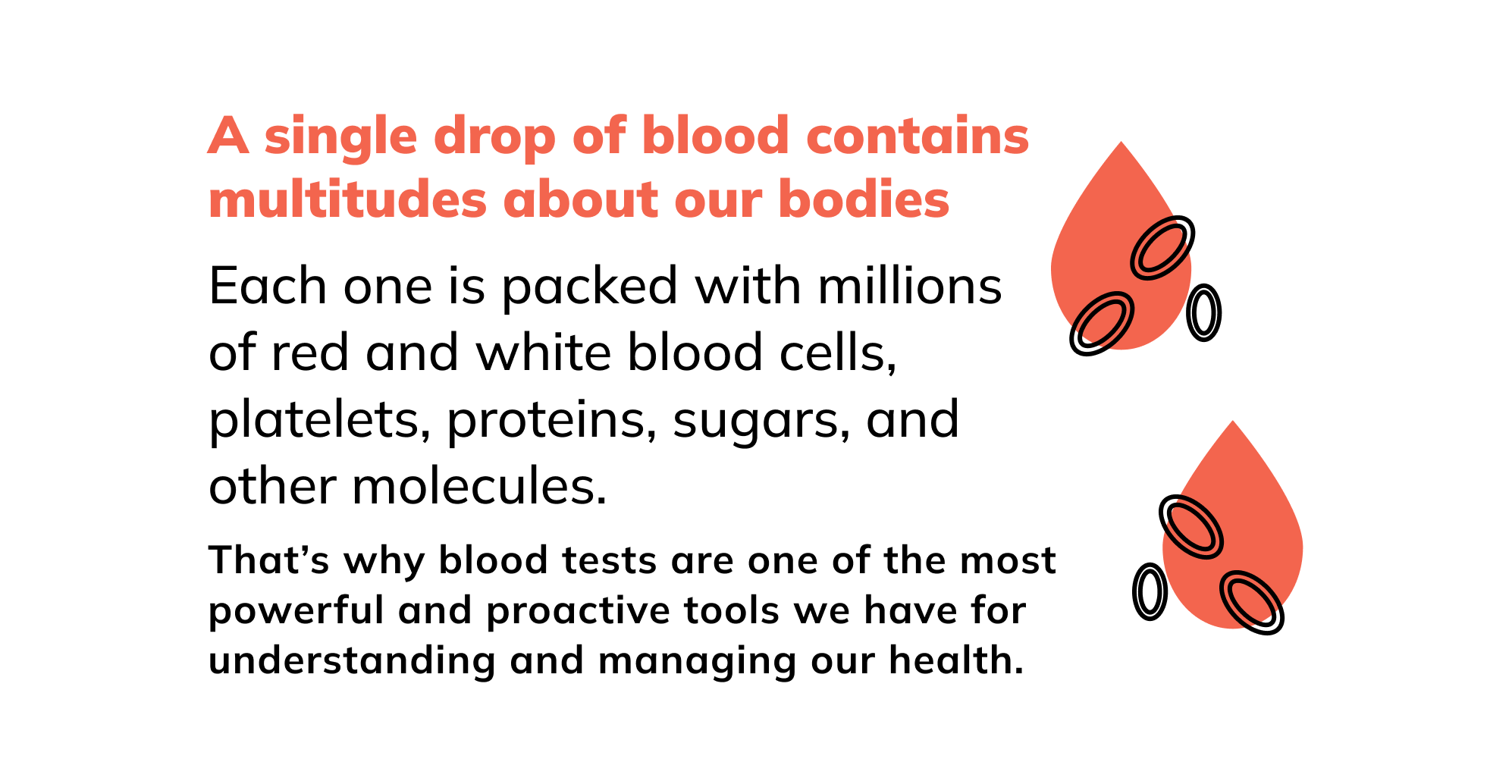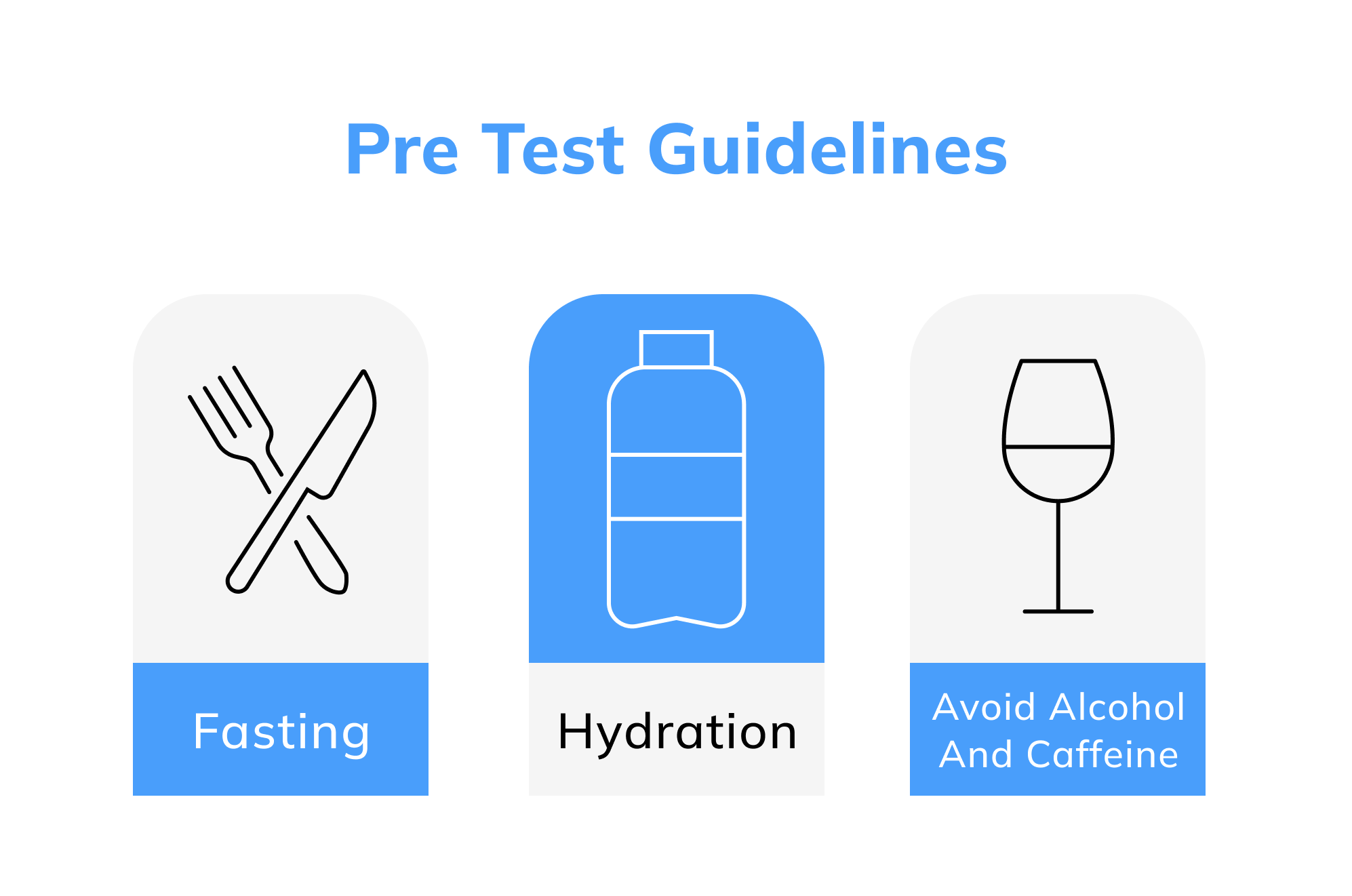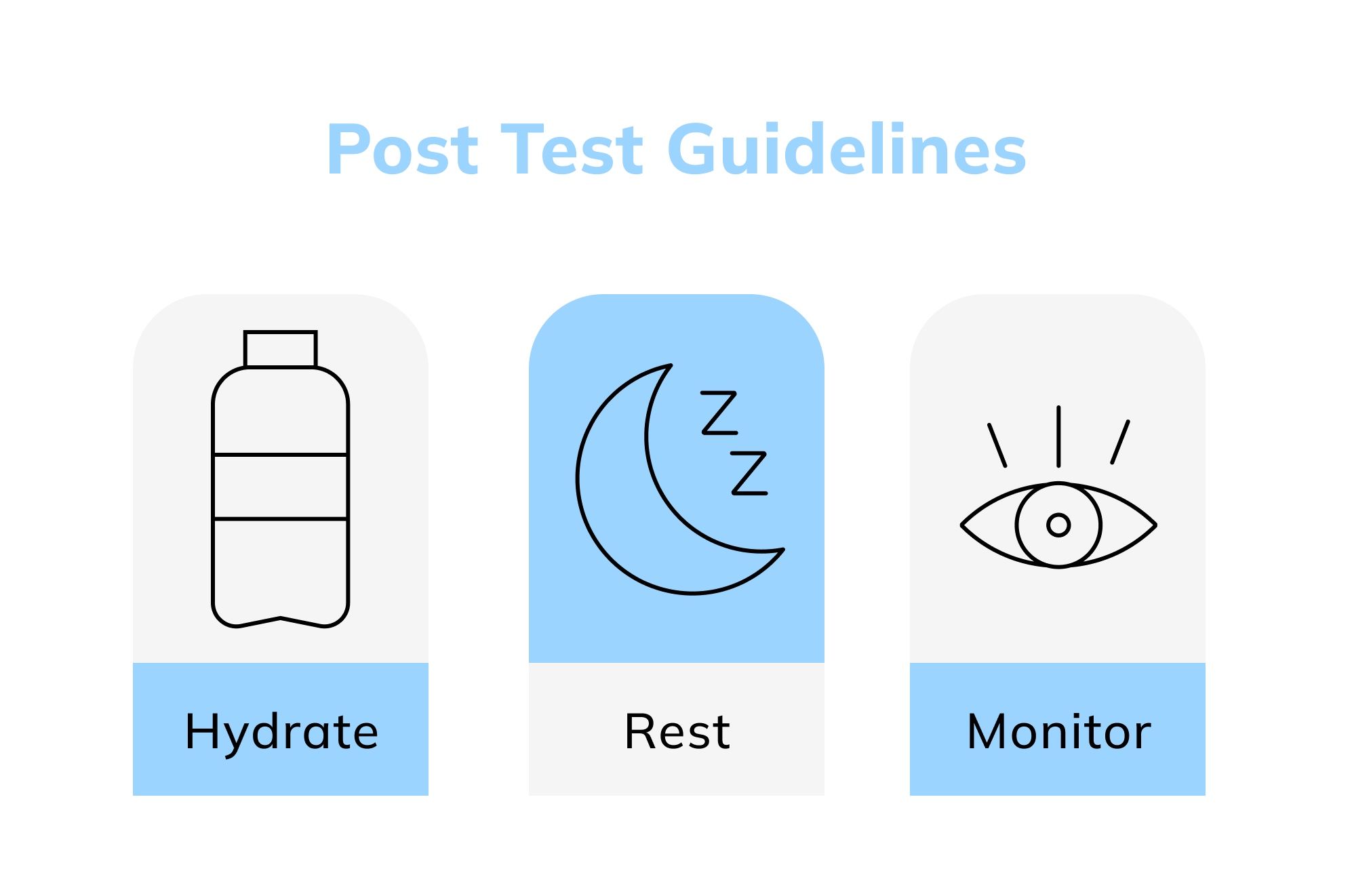Medically Reviewed by: Jared Meacham, PhD, RD, CSCS and Patricia Weiser, PharmD
If you’re taking proactive steps to manage your health, you may be wondering how to book a blood test. After all, blood tests offer critical information about what’s going on inside our bodies. No matter if you do your blood test in a clinic or at-home, analysing your blood test results (with the help of a trusted clinician) will paint a picture of your overall health.
Whether you’re monitoring a chronic condition, investigating a new symptom, staying on top of age-related screenings, or simply keeping an eye on your overall wellness for preventive purposes, blood tests offer critical insights into how your body is functioning.
Here’s everything you should know about why blood work matters, what types of blood tests are available, and how to book and prepare for your blood test appointment.
How to book a blood test
For standard lab testing covered by provincial health insurance, you'll need to obtain a requisition for the blood test first. Here are the steps you’ll take to book your blood test:
- Visit your family doctor, nurse practitioner, walk-in clinic, or use virtual care services like Maple for a signed blood test requisition.
- Book at major labs like LifeLabs (online through MyCareCompass) or Dynacare (many accept walk-ins).
- Bring your health card, photo ID, and signed requisition.
- Wait for your results.
Booking a blood test appointment with NiaHealth
Private companies like NiaHealth make getting blood tests incredibly simple and straightforward. Here are the steps you’ll take to schedule your test:
- Access 100+ biomarker tests on the NiaHealth platform.
- Book online without a doctor's referral. NiaHealth will handle all of the paperwork.
- Choose between visiting partner clinics (Ontario and Manitoba) or having a phlebotomist come to your home within 3 business days.
Get results in 7 business days with detailed health insights and personalised analysis from real clinicians.
In-clinic appointments: These are available in Ontario and Manitoba through our partner clinic, Dynacare. Depending on the location, an appointment may be necessary, says Tanya ter Keurs, a nurse practitioner and NiaHealth’s co-founder and clinical director. Most appointments are done as a walk-in.
When you sign up, your NiaHealth team will confirm whether your lab requires you to make an appointment. You’ll be able to monitor live wait times or do a virtual check-in at the clinic through the NiaHealth dashboard.
At-home mobile blood draws: You can choose to have a NiaHealth licensed phlebotomist visit your home or office within three business days of booking to administer your blood test(an additional fee applies for the mobile service). “Even within Ontario, many people prefer this option for convenience,” ter Keurs says. “The whole visit takes about 15 minutes.”
A head’s up: no matter how you book your blood test, you’ll need to fast 8-10 hours beforehand, stay hydrated, and avoid alcohol 48-72 hours prior to your appointment.
Why book a blood test?
Blood tests are an essential part of preventive healthcare, often detecting health risks before symptoms manifest. They empower you to monitor and manage existing conditions, and offer critical insights to inform lifestyle and treatment choices for better health outcomes.
“Blood tests help you catch health risks early—sometimes decades before symptoms appear,” says ter Keurs. “But it’s not just about getting tested; it’s about getting the right tests. By using carefully selected panels, we can detect issues like insulin resistance, high cholesterol and predisposition to high cholesterol caused by lifestyle and genetics, kidney problems, etc., long before they cause illness, disease, or major problems.”

Types of blood tests available
NiaHealth offers 100 different biomarker tests, all which can be checked and evaluated with a simple blood draw. “We offer comprehensive panels containing some more common and some more advanced biomarker testing,” ter Keurs says.
Here’s more information about some of the most useful types of blood tests available:
Standard panels
Complete Blood Count (CBC): A CBC measures red and white blood cells, hemoglobin (a protein in red blood cells), and platelets (cells that help with clotting) to assess general health. A CBC can help detect conditions in the blood, such as anemia, blood disorders, infection, inflammation, and certain cancers.
Here are some markers a CBC and other related tests measure:
- Red blood cell count (RBC): RBC shows the number of oxygen-carrying cells, which can help detect anemia, dehydration, issues with bone marrow, and other conditions.
- White blood cell count (WBC): White blood cells help fight infections, and there are five main types. A regular CBC shows your total white cell count, while a CBC with differential breaks down the number of each type. WBC counts help detect certain diseases, infections, and bone marrow function.
- Lymphocytes: Lymphocytes are important immune system soldiers that work to fight infections and even cancers. Abnormal levels can indicate immune disorders or other illnesses.
- Basophils and eosinophils: These two types of white blood cells are involved in allergic reactions, infections, and inflammation. High counts may suggest allergies, parasitic infections, or other conditions.
Lipid panels: Lipid panels are another important type of blood test that measures the amounts of fats in the blood, such as cholesterol and triglycerides, which are key ways to assess heart disease risk.
NiaHealth’s tests look closely at markers that are not often included in standard blood work. “Cholesterol panels with ApoB and Lp(a) are not typically offered in public care,” ter Keurs says. “These help assess your risk for cardiovascular disease earlier than standard protocols.”
Here’s a quick guide to some of these heart-health markers:
- LDL-c and HDL-c: You’ve likely heard of these two types of cholesterol. LDL (low-density lipoprotein)is known as “bad” cholesterol because it’s the kind that can clog, narrow, and harden arteries and raise the risk of heart attack, stroke, and other cardiovascular disease. HDL (high-density lipoprotein) is the “good” cholesterol. It actually protects the arteries by shuttling LDL cholesterol away from arteries and back to the liver.
- Lp(a): Short for lipoprotein(a), lp(a) is an LDL cholesterol (or “bad” cholesterol) particle in the blood with an additional protein attached. They’re more likely to attach to artery walls. Elevated levels indicate a higher risk of heart attack, stroke, and other cardiovascular disease.
- ApoB: ApoB, which stands for apolipoprotein B, is the main protein found in “bad” LDL cholesterol particles that are tied to cardiovascular risk. ApoB is considered to be a better predictor of heart disease risk because the tests measure the number of specifically atherogenic, or artery-clogging, particles in the blood.
Liver tests: “Liver stress markers can reflect the impact of substance use—like alcohol—before liver damage is clinically evident,” ter Keurs says.
- Albumin: Low levels of this protein can indicate a liver or kidney disorder or malnutrition.
- GGT: Alcohol and certain medications can raise gamma glutamyl transferase (GGT), a liver enzyme.
- Total bilirubin: High levels can point to possible liver dysfunction or anemia.
Metabolic tests: Metabolic disorders are conditions that disrupt how your body uses, stores, or makes energy from food. These disorders include type 1 and type 2 diabetes and metabolic syndrome, which is a collection of conditions that elevate the risk of both diabetes and cardiovascular disease, including high blood pressure and insulin resistance.
More than one in three Canadians has a metabolic disorder of some kind, according to researchers at the Metabolic Disorders and Complications Program (MeDiC) at McGill University in Montréal.
NiaHealth offers various metabolic blood tests. “Hemoglobin A1c and glucose markers can detect early signs of insulin resistance,” ter Keurs says. “When combined with your Dexa scan, which provides information about body composition, they can inform specific lifestyle changes to lower risk.”
- Fasting glucose: These tests check blood sugar levels for signs of prediabetes or diabetes.
- Hemoglobin A1c: These tests share average blood sugar levels over the past two to three months to determine diabetes risk and treatment for those already diagnosed.
Advanced biomarker testing
Advanced biomarker testing digs deeper than standard panels to assess more of what’s going on with our metabolic, cardiovascular, hormonal, liver, bone, and kidney health. Some of these tests include:
- Fasting insulin: This test shows how much insulin the body produces even when you haven’t eaten, which can indicate insulin resistance. Insulin resistance can be an early indicator of diabetes.
- hs-CRP: The high-sensitivity C-reactive protein (hs-CRP) test is a cardiovascular panel that measures C-reactive protein (CRP)—a known marker of inflammation when elevated. This test can detect even the slightest increases in CRP more accurately than a standard CRP test.
- TIBC: High levels of total iron binding capacity (TIBC) can point to iron-deficiency anemia.
Hormone panels
Our bodies are composed of more than 50 hormones, and our health and overall wellness are largely tied to how well they’re working. Blood tests can provide key insights into how our hormones are functioning.
- Total and free testosterone: Total testosterone measures testosterone that’s bound to proteins like albumin and sex-hormone binding globulin (SHBG) and free testosterone, which is unbound as it circulates in the blood. Free testosterone is the more active form of the hormone, so testing it as well as total testosterone offers a more accurate picture of testosterone levels and how it's working in the body.
- Thyroid hormones: TSH and T4 tests look at thyroid hormone levels and function. Too much or too little can indicate a thyroid disorder.
- Estradiol: Estradiol is the primary type of the three kinds of estrogen, affecting reproductive, breast, and bone health.
Micronutrient testing
Vitamin and mineral deficiencies can have a slew of negative outcomes in the body. Sometimes they can lead to serious health problems, including cognitive impairment, birth defects, bone weakness, fatigue, nerve problems, and more. Here are some micronutrient tests NiaHealth offers:
- Calcium: This mineral is key for strong bones and muscles.
- Iron: Several blood tests check different factors related to iron, which can help diagnose anemia, liver function, and other disorders. These tests “measure your body’s iron levels and can uncover issues with intake, gut absorption, blood loss, or even frequent blood donation,” ter Keurs says.
- Vitamin B12: Neurological problems can occur when we don’t get enough B12—of particular concern with those following vegan or vegetarian diets.
- Vitamin D: This vitamin helps with calcium absorption and is important for bone health. Vitamin D is known as the “sunshine vitamin,” as it can be synthesized in our body from sun exposure. Research has found Canadians are more likely to experience a vitamin D deficiency during colder months, or in summer as sunscreen is used to wisely prevent burns, photo aging, and skin cancers.
Specialized tests
Optional specialized tests give you even more insight to better optimize your healthspan and longevity. Some of these tests include:
VO₂ Max Test: A non-invasive way to measure cardiovascular fitness and endurance. Currently this test is available only in Toronto, Edmonton, Calgary, Vancouver, and Victoria.
DEXA Body Composition Scans: Provides precise data on bone density, muscle mass, and fat distribution. Currently this test is available only in Toronto, Edmonton, Calgary (SECA), Vancouver, and Victoria.
Gut Microbiome Test: Evaluates more than 50 gut microbes and how they affect metabolism and digestion.

Preparing for your blood test
Getting a blood test is a simple and (somewhat) painless procedure, but it does require some preparation ahead of time to ensure your data is as accurate as possible. Here are ter Keurs’ recommendations to prepare for your lab appointment:
- Fasting: “We recommend fasting for 8–10 hours before your test,” ter Keurs says. During a fast, only water is permitted. Sugar, protein, fat, and other substances in food and beverages besides water can make levels rise or fall, which could give an inaccurate picture of what’s going on in the body. For this reason, it’s probably a good idea to set up a morning appointment.
- Hydration: In fact, drinking plenty of water is encouraged. For starters, being properly hydrated can make the blood draw easier. “Staying hydrated helps improve the accuracy of tests like kidney function and hemoglobin,” ter Keurs says.
- Alcohol and caffeine: “Avoid alcohol for 48 to 72 hours prior to your blood test," ter Keurs says. “If you’ve consumed alcohol in the 24 to 48 hours before testing, we may need to interpret your results with that in mind.” Caffeine should be avoided or limited for 12 hours prior to your test in order to stay hydrated.
- Strenuous exercise: Avoid high intensity exercise for 24 hours leading up to your blood draw. Mild exercise is ok, but vigorous exercise can alter certain blood parameters, like creatine kinase.
What to expect during the appointment
Whether you’ve scheduled an in-clinic or mobile appointment, your blood test will be administered by a licensed phlebotomist who follows all required professional and hygienic procedures. The blood draw itself takes about 10 to 15 minutes. After your blood draw, you’ll be given immediate post-draw care instructions.
Post-test guidelines
Everyone responds to a blood test differently. Most people won’t experience any side effects from the test. "You might feel lightheaded or a little nauseous from fasting,” ter Keurs says. “It’s a good idea to eat a snack with both simple and complex carbs afterward.”
In addition to a light snack after your blood draw, these other suggestions can help if you’re feeling a little woozy afterward.
- Hydrate: Continue to drink water to replenish fluids.
- Rest: Avoid strenuous activities for at least two hours post-draw.
- Monitor: Keep an eye on the puncture site for any unusual symptoms, such as swelling or other skin reaction, and share it with your NiaHealth clinician, if necessary.

Receiving and understanding your results
The results of your blood test will be reviewed by NiaHealth's clinical team. Your results will be available within seven business days, ter Keurs says, and you’ll get a notification when your lab results are ready to be viewed in your NiaHealth dashboard.
Your clinician won’t just be sharing a bunch of numbers and charts. They’ll help you make sense of what all the data mean by providing comprehensive health summaries and personalised insights and strategies tailored just to you. And a real-live human clinician will be doing this—not AI.
You can expect a lot more attention and nuanced, detailed information about your health than you typically get in a standard 15-minute office visit.
NiaHealth adheres to all privacy and security guidelines and will not share your results with your insurance company or anyone else. You do have the option to share your results with your primary healthcare provider, if you choose to do so.
How much does a blood test cost?
Standard blood tests that are ordered by your family physician or other healthcare provider are covered by provincial health insurance and are free. More advanced biomarker tests, however, are often not covered by provincial insurance.
NiaHealth is a membership-based service that is not covered under public health insurance plans. Services are eligible for Health Spending Accounts (HSA) and recognized as CRA-eligible medical expenses.
It’s recommended you review the terms of your private health insurance plan or speak with your insurance plan provider first to see if NiaHealth’s services are eligible for reimbursement. NiaHealth’s free quoting tool can generate a personalised membership quote should your insurance provider need one.
NiaHealth offers four membership plans to suit your needs, each with transparent pricing and no hidden fees: Essential, Plus, Optimum, and Plus Family.
Testing with provincial healthcare:
Pros: testing is free
Cons: long wait times; often limited to very basic testing; may have outdated testing methods and results delivery
Testing with NiaHealth:
Pros: easy online booking; requisitions written by a nurse practitioner; fast, flexible visit and wait times; more than 100 comprehensive biomarker tests available; personalized support and detailed analysis of your results
Cons: paid membership required
The bottom line
NiaHealth makes it easy to be proactive about your health by assessing more than 100 different biomarkers in your body. Booking a blood test with NiaHealth to learn more about your health is fast and simple. Schedule your appointment today.
Key takeaways
- Blood tests are one of the best and simplest ways to be proactive about our health.
- Blood tests can help us monitor an existing health condition, explore what a new symptom could mean, and take mindful steps to optimize our longevity and healthspan.
- NiaHealth offers blood tests that assess more than 100 different biomarkers, ranging from standard panels to ultra-specialized advanced tests.
- NiaHealth members can choose to get a blood test at a partner clinic or have a licensed phlebotomist visit them in the comfort and convenience of their home or office.
- The results of your blood tests will be shared on your NiaHealth dashboard and reviewed by a NiaHealth clinician, who will provide a personalized analysis and detailed summary of the data.
Frequently asked questions (FAQ's)
Can I book a blood test without a doctor's referral?
A doctor’s referral is required for a blood test covered by public health insurance. For a blood test with NiaHealth, we look after the paperwork to make the whole process fast, convenient and flexible.
How do I ask for a blood test?
Your physician will determine which blood test they’ll order for you, and then you will book your test at a clinic (though walk-ins are available at some). With NiaHealth, you can choose the panel you want and schedule it through your NiaHealth dashboard.
Can you just walk in for a blood test?
It depends. Some clinics offer walk-in appointments. Most of NiaHealth’s partner clinics (in Ontario and Manitoba) offer a walk-in option.
How to go for a blood test?
Your physician and the clinic where you book your blood test will provide you with directions for getting your blood test. The NiaHealth dashboard offers step-by-step instructions on how to book your test, plus where and when to go once you’ve made your appointment.
How do I prepare if I have specific health conditions?
If you are having blood work done by your family doctor or nurse practitioner they can provide you with specific instructions of how to prepare. At NiaHealth you are provided with clear instructions through your dashboard and a member of the NiaHealth team is happy to answer any other questions you may have.
Can I book my own blood tests?
For tests covered by provincial insurance, you can book your own blood test appointment, but you’ll need a requisition from your doctor first. You can arrange your own blood tests with NiaHealth.







